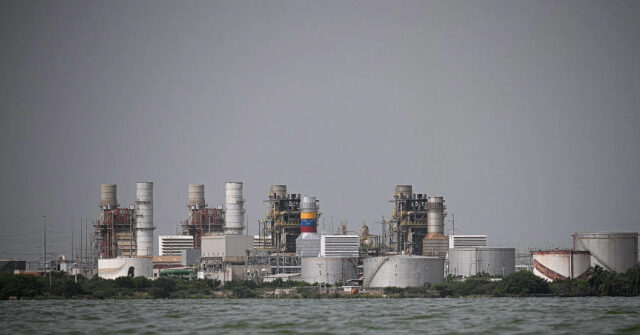
The Venezuelan newspaper Tal Cual reported on Sunday that the United States received 12 shipments of crude oil and asphalt from Venezuela after the July 28 sham presidential election, which socialist dictator Nicolás Maduro claims he “won” and the United States does not recognize as legitimate.
Tal Cual reported that, according to data it reviewed from maritime transport monitoring websites, the 12 ships departed from Venezuelan ports after the sham election. The tankers carried cargo belonging to California-based Chevron and the Spanish company Repsol — two of the companies that the administration of U.S. President Joe Biden has issued licenses to that allow them to resume oil production in Venezuela and sell Venezuelan oil in the U.S. and other markets.
The U.S.-bound shipments reportedly contained Merey and Boscán crude oil, as well as fuel oil and asphalt. Tal Cual reported that Venezuela’s state-owned oil company, PDVSA, received gasoline, diesel, and diluents in exchange. Each oil tanker reportedly carried a cargo of between 1.6 and 2 million barrels.
The United States, during the administration of former President Donald Trump, imposed sanctions on PDVSA in 2019 as a response to the Maduro regime’s ongoing human rights violations against its own people. Biden temporarily lifted the sanctions between October 2023 and April 2024 as part of a now-failed effort to entice Maduro to allow a “free and fair” election to occur in Venezuela.
In addition, Biden issued licenses to companies such as Chevron, Repsol, Shell, and BP that allow them to resume operations in Venezuela, including new deals involving joint ventures that these companies have with PDVSA, such as PDVSA and Repsol’s Petroquiriquire joint venture.
Venezuela held a sham election on July 28 that the Maduro regime’s electoral authorities claim dictator Maduro “won.” The United States is among the list of countries that do not recognize Maduro’s claimed victory as legitimate. U.S. Secretary of State Antony Blinken has recognized opposition candidate Edmundo González as the winner of the election.
Tal Cual points out that while Maduro has rejected the United States’ stance on the sham election, PDVSA continues to export oil to the United States, its erstwhile top buyer.
“PDVSA has to continue invoicing in some way and even more after the disaster generated by the PDVSA-Cripto corruption scheme with which billions of dollars were lost,” an oil expert who preferred to remain anonymous told Tal Cual:
Of course there is the possibility of new sanctions or greater restrictions in the oil market and that also makes them hurry to send the cargoes as soon as possible, and I am not only talking about PDVSA, but also about Repsol and Chevron, which must collect what Venezuela owes them.
Tal Cual reported that, in addition to the U.S.-bound shipments, other tankers sailed to other countries, such as Cuba, Belgium, Colombia, Spain, and Malaysia, and to nations with which the Maduro regime has recently cut ties for questioning the “results” of the sham presidential election, such as Panama and the Dominican Republic.
Biden’s six-month sanctions relief package and the licenses granted to oil companies have resulted in Venezuela experiencing a 49-percent surge in its U.S.-bound oil exports during April 2024 year-on-year, as well as a 51-percent increase between January and April. The surge reportedly allowed Venezuela to rank sixth among the list of top oil-sending countries to the United States.
Venezuela’s oil exports reportedly rose 30 percent during May 2024 compared to May 2023 after having experienced a drop due to the sanctions reinstatement wind-down period.
Tal Cual points out that Venezuela, which once occupied top positions on the list of countries that export oil to the United States, had dropped to the bottom following the imposition of oil sanctions on PDVSA. The newspaper explained that Venezuela was able to climb back to the sixth position thanks to the easing of sanctions and the licenses granted to Chevron and Repsol.
“Although the latest report published by the [Energy Information Administration] offers information from May, it shows the growth of Venezuelan exports in 2024 and ratifies the importance of the North American market for Venezuelan crude oil,” the report stated. “Political diatribe and ideological differences also gave way to the oil business.”
